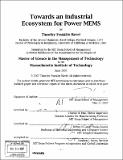Towards and industrial ecosystem for power MEMS
Author(s)
Havel, Timothy Franklin
DownloadFull printable version (7.989Mb)
Other Contributors
Management of Technology Program.
Advisor
Charles H. Fine.
Terms of use
Metadata
Show full item recordAbstract
This thesis is concerned with the commercial applications of MEMS (Micro-Electro-Mechanical Systems) manufacturing processes to advanced energy technologies. This field of engineering has come to be known as Power MEMS. Four such technologies are singled-out for detailed consideration, based on the efforts that have gone into demonstrating the benefits which MEMS has to offer them. The first are micro engines or turbines which generate of order 10-100 Watts of power by driving an electric generator, as exemplified by the famous MIT microturbine. The second are micro fuel cells, electrochemical devices which air oxidize chemical fuels, particularly the direct methanol fuel cell which operates at modest temperatures and hence is suitable for use in portable electronics. The third are solid-state devices which convert heat into electricity via either the Seeback (thermocouple) or photovoltaic effects, or else via thermionic emission. Finally, we consider devices which scavenge vibrational or electromagnetic energy from their environment, and are an attractive means of powering remote autonomous sensors or medical implants such as pacemakers. (cont.) Following a survey of recent commercial activity in these technologies, we consider the markets they may serve, the economics of their MEMS-based production, and possible business models for their commercialization. Detailed case studies are presented of two recent startups, one of which is developing a heat-to-electricity conversion system based on the photovoltaic effect, and the other of which is studying a novel MEMS device which would use springs made out of carbon nanotubes to store energy. The conclusion is that the time is ripe for a power MEMS technology roadmap which can inspire energy technology companies to work together towards an industrial ecosystem like that now seen in the semiconductor industry. Specifically, we propose that by using MEMS as a unifying technology, it will become possible to easily buy, sell and trade knowledge, personnel, components and foundry services, facilitating experimentation with new products and business models and greatly accelerating the development of power MEMS itself. This may in turn lead to solutions to some of the pressing energy and environmental problems which society now faces.
Description
Thesis (S.M.M.O.T.)--Massachusetts Institute of Technology, Sloan School of Management, Management of Technology Program, 2007. Vita. Includes bibliographical references.
Date issued
2007Department
Management of Technology Program.; Sloan School of ManagementPublisher
Massachusetts Institute of Technology
Keywords
Management of Technology Program.